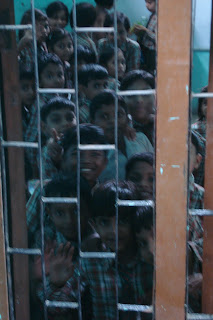Lets take a look at these wise men who are mentioned in Matthew's edition of the life of Jesus. Only Matthew and Luke give us historical details about the birth of Christ. Matthew chooses to tell us about these strange visitors from the east, Luke chooses to leave that out but instead tell us about shepherds in fields nearby watching their sheep. One of the hints, by the way, that Jesus was not born on December 25th.
We know these men were astrologers of some kind and that Matthew refers to them as Magi. Now, hundreds of years before, there was a nation which grew into a short lived, but large, empire called the Medes. This empire stretched from the Indus River valley in the east (Pakistan today), to Anatolia in the west (Turkey today). This empire was made of of six tribes, one of which was called the tribe of Magi.
 |
| photo credit |
This tribe was a priestly tribe in the same way that the tribe of Levi was to the Jews or that Druids would were to the Celts. They were very educated having spent a lot of time learning about the natural world, including medicines, herbs and the movements of the cosmos, and how they might foretell impending events on earth. These men were soothsayers, interpreters of dreams, philosophers, naturalists and would have been highly regarded members of society.
Astrology, one of their specialties, was a widely known and used approach to telling ones future. Reading the cosmos was a science to these men. We do not know what brilliant star the Magi saw but whatever it was the message interpreted was compelling.
And of course, as everyone in the ancient world knows, the best astrologers came from the east. If you were going to have some one read the stars for you, you wanted an astrologer from the east, because those westerners don't know what they are talking about.
 |
| Credit |
This message impelled them to journey hundreds of miles across varied terrain for what what likely several months into the territory of a neighboring empire (which was hardly ever neighborly). They carried supplies for the journey, they carried money so they could resupply along the way, they had animals to carry the supplies and money, they had extra men to help them keep track of all the supplies and the animals carrying the supplies. And of course with all the animals and supplies and men to help with everything they would have drawn some attention to themselves so they would likely have had some armed security to help to protect them on their journey as well as money and supplies for those men too. Not to mention the expensive gifts that were being brought to honor this new born king.
We don't know exactly were they left
from but if we were to place them in the center of the region where the Median empire was, that would put them in the middle of modern day Iran just
south of the southern tip of the Caspian Sea. IF they left from there
(modern day Tehran) and followed the trade routes, their journey was
likely around 2,000 miles. That is a long distance to travel
to honor someone who is not one of your own people and will not be your
king. If you estimate the amount of time it would take to make that
journey you could say that the Magi likely saw the star in the east
around the same time that the angel appeared to Jesus' parents.
 |
| Credit |
Keeping all this in mind, I wonder... Why?
Why the long journey?
Why Magi?
Why not wise men from the country Jesus was born in?
Why not wise men from the Jews?
What is God telling the world by making this announcement to men who don't believe in the Jewish God?
Why not someone that others would believe?
This says something about the way God does things. We can ask why God did not announce to the the Jewish people the arrival of their Messiah; except, he had been speaking to them through the prophets for hundreds of years in the Hebrew Scriptures. In fact when the Eastern wise men arrived and asked where to find this king, the Jewish wise men knew exactly where to look, Bethlehem.
The Magi traveled upwards of 2,000 miles to meet this newborn King, the Jewish scholars would not travel the six miles from Jerusalem to Bethlehem to even see if it was true.
 |
Herod was so concerned that this newborn King might take over his rulership and his Kingdom that he ordered all baby boys in and around Bethlehem slaughtered. He did not understand the kind of King that Jesus would be or the kind of Kingdom that he would establish.
I guess what I am saying is that according to Matthew's edition of the the birth of Christ, the wrong kinds of people are hearing about Jesus. What is worse they are taking action. The ones who have the Bible memorized and can quote all kinds of verses to you, they end up being the ones who miss the whole point. Matthew is telling us that God chooses the most unlikely people, the people that most others would overlook. God chooses the J.V. kinds of people, the second stringers, the ones who get ruled out, the ones who sit by themselves at lunch, even those who like country music. God did not announce his arrival to the Roman leaders or the Jewish leaders, but to astrologers who did not even believe in the Jewish God.
What does that say about who should be in your church?
What does that say about how God speaks to us?
What do you think that says about what God things about you?
The God of this story invites people no one else invites... He wants the people most of us don't even consider... this God says that even you are invited into His story... You don't have to have it all figured out to have a spot at His table...
This God invites you with all your questions, and your doubts, and your bad theology, and your bad taste in music (if you like country)...
Just a Meandering Thought...











